Foods to be avoided when feeding infants and why
When you start introducing solid foods to your baby, you immediately run into the question of what foods to avoid for babies, since they may be harmful to the child. Most babies can eat almost any kind of food if you start slowly. But there are some very important foods to avoid during your baby’s first year.
We have gathered the most recent recommendations on foods to avoid for babies. Unless serious food allergies run in your family or your baby seems to be very sensitive, the list isn’t that long.
If you do have food allergies in your family, this list is not for you. In such case or if you suspect that your baby may be sensitive to some foods, you should talk to your baby’s doctor about what foods to avoid and how to proceed.
The list below is divided Important Foods to Avoid and Foods to Avoid – Not Critical depending on your ambitions and personal view.
For a printable version of this list, click here:
Important Foods to Avoid Under 12 Months of Age
- Salt
- Honey
- Spinach, beets, turnips, collard greens and carrots
- Peanuts and other nuts
- Cow’s milk
- Unpasteurized milk
- Grains that contain gluten
- Fish, egg and citrus
- Rice milk
Salt
What to do?
Don’t use any salt at all in your baby’s food until he or she is 1 year old. (And continue to be restrictive after that.) The salt that is already in the breast milk or formula is enough.
Also, don’t offer food that contains a lot of salt, such as some sausages, broths or potato chips. Even breakfast cereal can contain a lot of salt. Check the nutritional information. Also, if you use bottled water for your baby’s formula, or just for drinking, make sure the water is not high in sodium.
What can happen?
Babies’ kidneys are not developed enough to be able to handle too much salt, so the salt can cause damage.
Honey
What to do?
Honey is actually one of the most important foods to avoid during your baby’s first year. This includes also corn syrup and maple syrup.
What can happen?
Honey can contain bacterial spores that can lead to infant botulism. This is a rare but very serious disease that can be fatal. Even if international studies only have found these spores in honey in a few cases, the disease is so serious that the recommendation is to not give your baby honey in any form until the baby is 1-year-old. Some research also indicates that botulism spores may be one possible cause of Sudden Infant Death Syndrome or “crib death”.
Only babies can get infant botulism; adults and older children are not affected.
If your baby has been fed honey, the risk is still very low that your baby will suffer infant botulism. The most common and earliest symptom is constipation. Other symptoms include generalized weakness, a weak cry, poor sucking reflex, irritability, lack of facial expression, and loss of head control. If you are at all worried, contact a pediatrician.
Spinach, beets, turnips, collard greens and carrots
What to do?
Be careful when using vegetables that are high in nitrates when making homemade baby food.
Such vegetables are:
- Spinach
- Cabbage
- Beets
- Turnips
- Broccoli
- Carrots
These vegetables are high in nitrates and are foods to avoid for babies younger than 4 months old. Actually where I live, the general recommendation is to avoid spinach and beets until the baby is 1 year old, but all studies that I have found indicate that the risks connected to nitrates more or less disappear around the age of 4 months.
Still, it is wise to be careful!
Studies have also shown that organic vegetables are lower in nitrates than conventional vegetables.
Nitrate levels are also affected by how the foods are prepared:
- The vegetables need to be frozen directly after harvest.
- Do not use vegetables that have been frozen for more than five months.
- Vegetables should not be thawed for longer than 15 hours in room temperature
- Do not store prepared foods from these vegetables for any length of time.
- Finally, do not use well water to cook food for your baby unless the nitrate content has been checked.
Commercially prepared canned baby food of these foods can be used without risk, since their nitrate content is controlled.
What can happen?
Nitrate can be harmful to young babies, in the worst cases leading to the Blue Baby disease. What happens is that a too high concentration of nitrates can prevent oxygen from being carried properly in your baby’s blood. Low oxygen in the blood will cause babies to have blue-colored skin, which is why the disease is commonly called “blue baby” disease.
This disease is also called “methemoglobinemia.” A few cases of blue baby disease from spinach have been found in Germany. The young babies were fed spinach pureed at home and stored in a poor way.
The younger the baby, the higher the risks.
Just be careful in the beginning and your baby will be fine!
Peanuts and other nuts
What to do?
The recommendation on nuts has changed completely in the past few years due to new research. Earlier, the recommendation was to avoid nuts to babies under 12 months.
The new recommendation is to introduce peanut-containing foods into the diets of babies as young as 4 to 6 months – i.e. early when you start introducing solid foods – especially if they are at risk for peanut allergy because they had severe eczema, egg allergy, or both.
This is because a large study showed that early introduction of peanut-containing foods to high-risk groups of babies, can reduce the risk of developing peanut allergy with as much as 81!
So here are the new guidelines:
1) Guideline for infants with severe eczema, egg allergy, or both
Since these conditions increase the risk of peanut allergy, your baby should have peanut-containing foods introduced into the diet as early as 4 to 6 months of age.
Check with your infant’s healthcare provider before feeding your infant peanut-containing foods. The doctor may want to perform an allergy test first or recommend how to best introduce peanuts in a safe way.
2) Guideline for babies with mild to moderate eczema
For these babies, he or she may have peanut-containing foods introduced into the diet around 6 months of age to reduce the risk of developing a peanut allergy.
In this case, however, early introduction is not as crucial and your own feeding preferences can decide whether to introduce peanuts early or not.
Your child’s healthcare provider can tell you whether your child’s eczema is mild to moderate.
3) Guideline for babies with no eczema or food allergy
For these babies, you can freely introduce peanut-containing foods into his or her diet whenever you want.
How to introduce peanuts to babies
While beneficial from an allergy point of view, nuts of any kind are still a severe choking hazard. Please note that infants and small children should never be given whole peanuts due to the risk of choking.
It is recommended to introduce other solid foods into your baby’s diet before trying peanut-containing foods. But when you do start, the recommendation by American College of Allergy, Asthma and Immunology is to:
- Add hot water to 2 teaspoons of peanut butter to make a warm (not hot!) puree.
- Put a little of this puree on the tip of a spoon and feed it to your child.
- Wait and watch for 10 minutes, checking the baby for any negative reaction, such as hives, a rash, behavior changes or trouble breathing.
- If there are no negative reactions as all, you can continue to feed the puree slowly; but keep an eye on the child for about two hours.
A little bit scary, but important to avoid peanut allergy for your baby in the future!
What can happen?
Nuts should be introduced according to the guidelines for two reasons:
- Children may develop an allergy; peanuts especially are very allergenic.
- They are a potential choking hazard.
Cow’s milk
What to do?
Many babies can handle some dairy products when they are around 6 months old. However, most countries recommend avoiding cow’s milk as a drink during the baby’s first year.
In the US, the general recommendation is to start with small servings of dairy products when the baby is 9 months old and to wait with cow’s milk as a drink until the baby is 1-year-old.
Skim milk and low-fat milk products are foods to avoid completely for babies. They supply too much protein, potassium, and sodium and not enough calories for the growing infant. Children also need fat for proper growth and development including brain development. (You can read more about giving fat to babies here.)
What can happen?
Infants who are fed whole cow’s milk receive inadequate amounts of vitamin E, iron, and essential fatty acids. They also receive excessive amounts of protein, sodium, and potassium. These levels may be too high for the baby’s system to handle. Additionally, whole cow’s milk protein and fat are difficult for an infant to digest and absorb.
The most obvious effects are on iron levels in the body. Babies fed breast milk or iron-fortified formula have normal iron levels. Recent studies show infants often have depleted levels when started on cow’s milk at six months of age.
Also, some babies may not be able to handle the milk protein. If your baby throws up or has stomach pain after consuming dairy products, contact a pediatrician to schedule an investigation.
Unpasteurized milk
What to do?
Don’t give unpasteurized milk to your baby, actually not even to your toddler.
What can happen?
When milk is being pasteurized, i.e. heated, bacteria that may be in the milk dies. Some bacteria, for example, E. coli, are known to give young babies and children severe diarrhea.
Grains that contain gluten
What to do?
This one is a bit tough, because recommendations vary between countries.
The earlier most common recommendation was to start slowly with grains while still breastfeeding. A study published in 2010 indicated a lower rate of celiac disease in families with a history of this disease when gluten was introduced to the baby between 3 and 7 months of age.
However, a large study published in January 2015, concluded no correlation between the timing of gluten introduction to infants and the development of celiac disease. (Celiac Disease Not Tied to Gluten Timing in Infants. Medscape. Jan 19, 2015.)
There are also two more recent studies that have a connection between the amount of gluten intake during childhood and the risk for celiac disease and diabetes type 1.
Due to this new research, several countries, including the EU, have now changed their recommendations. The timing of the introduction seems to be less important than the amount of gluten introduced.
Hence, the most recent recommendation is to start with gluten at some point between 4 and 12 months and to start with small amounts.
It does not seem to be important to start while breastfeeding. You can read read more about this research and the recommendation in this report by the European Society for PediatricGastroenterology, Hepatology, and Nutrition.
If celiac disease runs in your family, talk to your baby’s doctor about your situation.
What can happen?
Your baby could develop gluten intolerance, also called celiac disease. Celiac disease is a digestive disease that damages the small intestine and interferes with absorption of nutrients from food. People who have celiac disease cannot tolerate gluten, which is found in wheat, rye, and barley.
Gluten intolerance is hard to diagnose, but if your baby has diarrhea that won’t go away, smelly stools, does not gain weight and maybe has a bloated abdomen, you should contact a doctor. The tendency to get the disease is inherited.
Fish, egg and citrus
What to do?
You may want to start slowly with these three foods.
Again recommendations vary between countries. Some say these are foods to avoid until the baby is one-year-old or even older, others say that it is perfectly fine to introduce these foods at some point between 8 months and 1 year.
Regarding fish, make sure the fish you choose to serve is not known to have high mercury levels. Also, start with “white flesh” fish types, such as Flounder, Haddock, Cod, and Sole, since these are considered to be the least allergenic. Check with your baby’s doctor before introducing fish, and especially shellfish to your child.
What can happen?
These foods are allergenic. Shellfish are generally worse than fish. Allergic reactions can be anything from mild to deadly; the latter occurs mainly from shellfish, although uncommon.
Rice milk
What to do?
A relatively new recommendation is to avoid rice milk for babies and toddlers, and actually for all children younger than 4-5 years old.
If your toddler is allergic to cow’s milk, try other milk substitutes than rice milk. And for babies younger than 1 year, stick with breast milk or baby formula.
What can happen?
The reason to avoid rice milk for young children is that it contains too high levels of arsenic. Research has shown that high levels of arsenic in a child’s body can have quite bad effects over time. According to Dartmouth Toxic Metals Superfund Research Program, arsenic in a child’s body can lead t:
- Lower IQ
- Impaired brain development
- Growth problems
- Breathing problems
- An unhealthy immune system
- Cancer as an adult
In addition, rice milk is not a nutritionally good substitute for either breast milk, baby formula or cow’s milk.
Foods to Avoid For Babies and Toddlers – Not Critical but Healthy!
Here we list foods to avoid for babies and toddlers more for their possible long-term effects on your baby’s health and well-being.
Fried and smoked food
What to do?
Fried, deep-fried and smoked food is another type of food to avoid. It is important to at least take away the crust if the food is deep-fried or fried.
What can happen?
Fried and smoked foods are much harder for the baby to digest than cooked foods.
Whole-grain products
What to do?
Start slowly! Whole-grain products can be hard for babies and toddlers to digest.
What can happen?
Whole-grain products are often marketed to desperate parents as a way to make their baby sleep better. The reason is that whole-grains make your baby stay full for a longer period.
While this may or may not be true for your child, this hunt for sleep may come at a cost – diarrhea! If your baby’s stomach seems upset and your baby is not ill, try excluding all whole-grain products from his diet.
Sugar
What to do?
Avoid sugar for as long as you can, particularly white sugar.
What can happen?
Sugar causes tooth decay and obesity and may be harmful in other ways too. Avoid giving your baby sugar for as long as possible including foods, snacks, and drinks that contain a lot of sugar. Remember that fruit juice contains a lot of sugar even if no extra sugar has been added. Give your baby real fruits instead. You can learn more about baby tooth decay here.
Artificial sweeteners
What to do?
Avoid artificial sweeteners for as long as you can.
What can happen?
These substances (such as aspartame and sucralose) are quite new and the health effects of using them are not all that clear. There are studies indicating a higher risk of Diabetes Type 2 and obesity for children consuming artificial sweeteners for an extended time. Why risk it?
That was it! However, I can’t stress enough that if you have food allergies in your family, there may be other foods to avoid or handle with caution. In such cases, you must talk to your baby’s doctor!
And if you want a printable version of this list of foods to avoid for babies, you find it here:
Do you still need help with your baby’s eating habits? You’ll find a large number of baby feeding questions already answered here.
Feel free to share your thoughts about this by leaving a comment below. :-)

Paula Dennholt founded Easy Baby Life in 2006 and has been a passionate parenting and pregnancy writer since then. Her parenting approach and writing are based on studies in cognitive-behavioral models and therapy for children and her experience as a mother and stepmother. Life as a parent has convinced her of how crucial it is to put relationships before rules. She strongly believes in positive parenting and a science-based approach.
Paula cooperates with a team of pediatricians who assist in reviewing and writing articles.

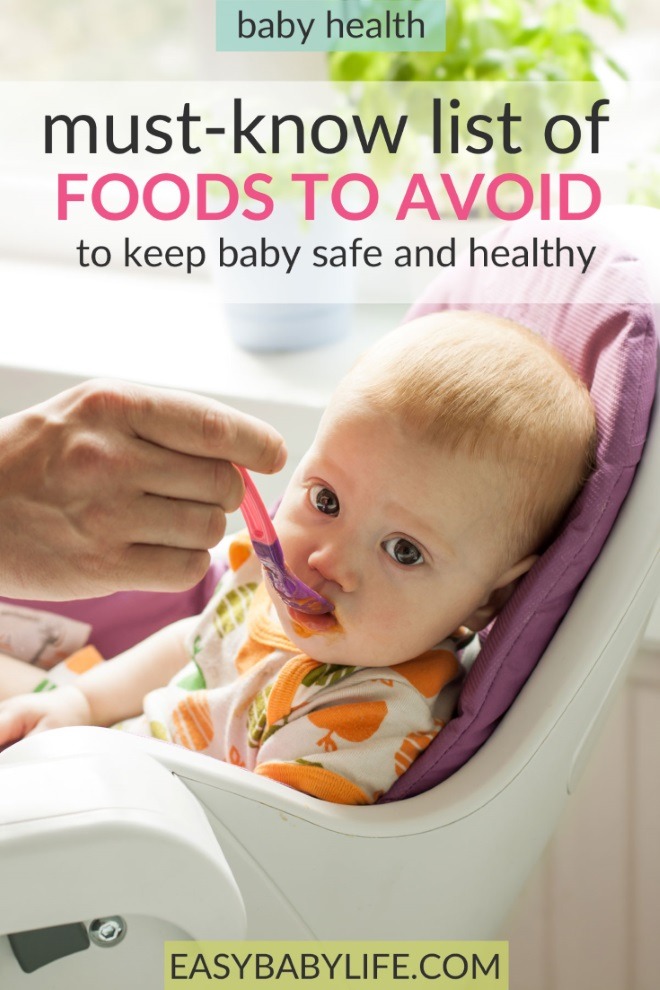

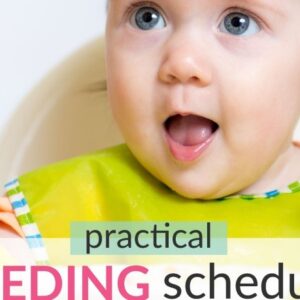
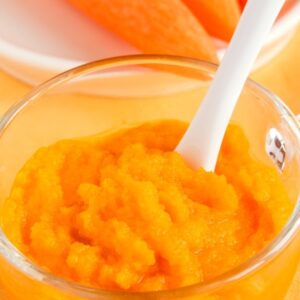
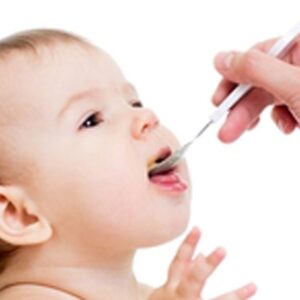
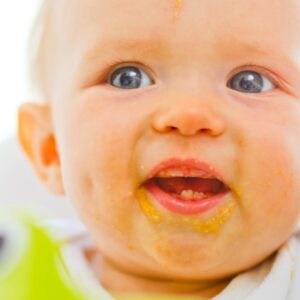

You actually SHOULD give your baby nuts (of course in the form of peanut butter etc. so she won’t choke) since it is huge misbelieve that it is the cause for allergies. The opposite is the case according to recent studies: https://www.bbc.com/news/health-35727244
The above article on BBC states that “a study claimed early exposure to peanut products could cut the risk of allergy by 80%.”
Thanks a lot! You are completely right and this is included in the recommendations above. :-)
Paula (Easy Baby Life)
True, my pediatrician also said introduce everything but honey. But just start off with one food at a time, incase there is a food allergy, you can know the culprit.